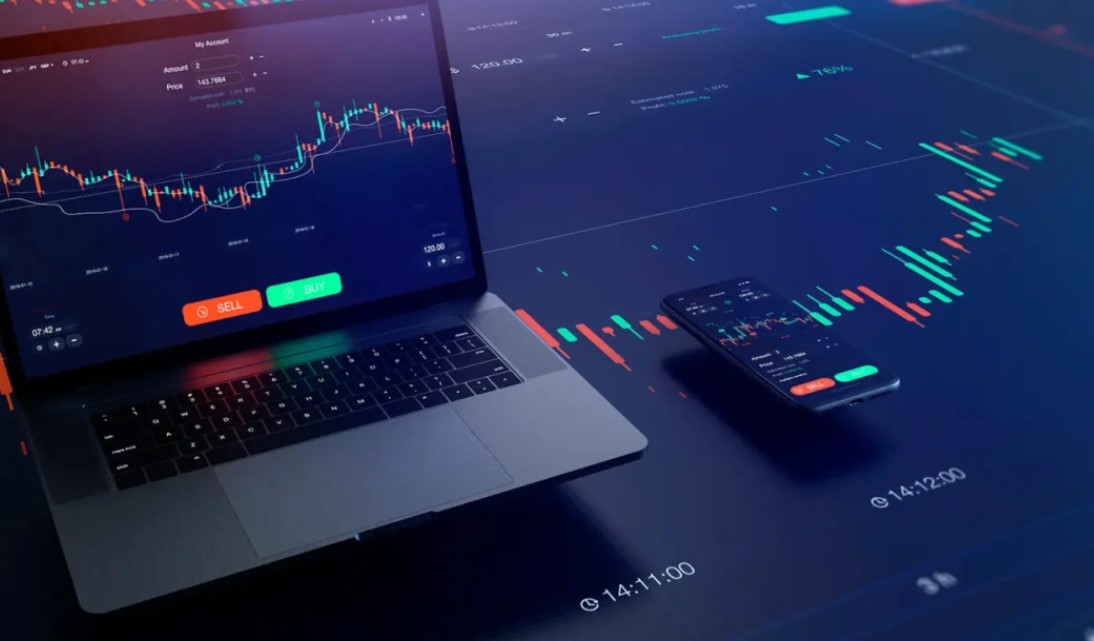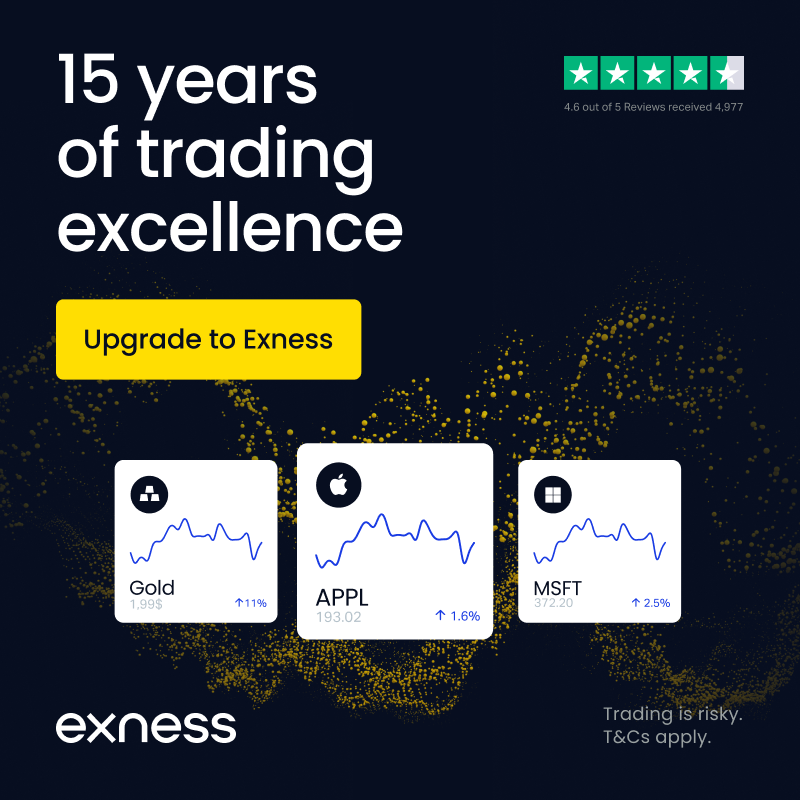
8 minute read
How to Start Forex Trading in Nepal: A Comprehensive Guide
from Exness
by Exness_Blog
Forex trading, or foreign exchange trading, has gained significant traction worldwide as a viable way to generate income. In Nepal, where economic opportunities are evolving, forex trading offers an exciting avenue for individuals to explore financial markets. However, starting forex trading in Nepal requires careful planning, knowledge, and adherence to local regulations. This comprehensive guide will walk you through the essential steps to begin forex trading in Nepal, ensuring you’re equipped with the knowledge to succeed.
Top 4 Best Forex Brokers in Nepal
1️⃣ Exness: Open An Account or Visit Brokers 🏆
2️⃣ XM: Open An Account or Visit Brokers 💥
3️⃣ JustMarkets: Open An Account or Visit Brokers ✅
4️⃣ Quotex: Open An Account or Visit Brokers 🌐
What is Forex Trading?
Forex trading involves buying and selling currencies in the global foreign exchange market to profit from fluctuations in exchange rates. For example, you might buy US dollars (USD) against the Nepalese Rupee (NPR) if you believe the USD will strengthen. The forex market operates 24/5, making it accessible for traders in Nepal to participate at any time.
With Nepal’s growing internet penetration and interest in online income streams, forex trading has become an appealing option for many. However, success requires education, discipline, and the right tools. Let’s dive into how you can start forex trading in Nepal.
Is Forex Trading Legal in Nepal?
Before starting, it’s crucial to understand the legal landscape. In Nepal, forex trading is a gray area. The Nepal Rastra Bank (NRB), the country’s central bank, imposes strict regulations on foreign exchange transactions. Residents are generally prohibited from engaging in speculative forex trading through unauthorized platforms, and the NRB restricts moving money abroad for such purposes.
However, many Nepalese traders use international brokers to trade forex, often routing funds through digital payment systems or offshore accounts. While this practice is common, it carries risks, as it may violate NRB regulations. To stay safe, consult a financial advisor or legal expert to ensure compliance with local laws.
Steps to Start Forex Trading in Nepal
1. Educate Yourself About Forex Trading
The first step to becoming a successful forex trader is understanding the market. Forex trading is complex, involving terms like pips, leverage, spreads, and margin. Here’s how to get started:
· Learn the Basics: Familiarize yourself with currency pairs (e.g., USD/EUR, USD/JPY), how prices move, and what influences exchange rates (e.g., economic data, geopolitical events).
· Free Resources: Use online platforms like BabyPips, Investopedia, or YouTube channels dedicated to forex trading to build foundational knowledge.
· Understand Risk: Forex trading is high-risk. Only trade with money you can afford to lose, as losses are common, especially for beginners.
Set aside at least 1-2 months to study before risking real money. Knowledge is your strongest asset in forex trading.
2. Choose a Reliable Forex Broker
Selecting a reputable broker is critical, as Nepal lacks domestic forex brokers. International brokers are your best option, but you must choose wisely. Consider the following:
· Regulation: Opt for brokers regulated by trusted authorities like the FCA (UK), ASIC (Australia), or CySEC (Cyprus). Examples include Exness, FBS, and IC Markets.
· Account Types: Look for brokers offering micro or cent accounts, ideal for beginners with limited capital.
· Deposit and Withdrawal Options: Since Nepal has restrictions on foreign transactions, choose brokers that support payment methods like e-wallets (Skrill, Neteller) or cryptocurrencies.
· Low Spreads and Fees: Compare spreads and commissions to minimize trading costs.
· Customer Support: Ensure the broker offers 24/7 support, as forex markets operate round-the-clock.
Research user reviews on platforms like Trustpilot or Forex Peace Army to verify a broker’s reliability. Avoid unregulated brokers to protect your funds.

💥 Trade with Exness now: Open An Account or Visit Brokers 🏆
3. Open a Forex Trading Account
Once you’ve chosen a broker, follow these steps to open an account:
· Sign Up: Visit the broker’s website and complete the registration process. You’ll need to provide personal details and verify your identity with documents like a passport or citizenship card.
· Choose an Account Type: Start with a demo account to practice trading without risking real money. Most brokers offer demo accounts with virtual funds.
· Deposit Funds: For live trading, deposit funds using a supported payment method. In Nepal, e-wallets or bank cards are commonly used due to restrictions on direct bank transfers.
· Download a Trading Platform: Most brokers offer MetaTrader 4 (MT4) or MetaTrader 5 (MT5), which are user-friendly platforms for trading forex.
Test the broker’s platform and customer service with a small deposit before committing larger sums.
4. Develop a Trading Strategy
A solid trading strategy is essential for consistent results. Without a plan, you’re gambling, not trading. Here’s how to create one:
· Choose a Trading Style: Decide whether you’ll be a day trader, swing trader, or position trader based on your time availability and risk tolerance.
· Technical Analysis: Learn to read charts using indicators like Moving Averages, Relative Strength Index (RSI), or Fibonacci retracement.
· Fundamental Analysis: Stay updated on global economic news, such as interest rate changes or GDP reports, which impact currency prices.
· Risk Management: Never risk more than 1-2% of your account on a single trade. Use stop-loss orders to limit potential losses.
Backtest your strategy on a demo account to ensure it works before trading with real money.
5. Practice with a Demo Account
A demo account is a risk-free way to practice trading. It allows you to:
· Test your strategy in real market conditions.
· Get familiar with the trading platform.
· Build confidence without financial risk.
Spend at least 2-3 months practicing on a demo account until you achieve consistent results. Only then should you transition to a live account.
6. Fund Your Account and Start Trading
Once you’re confident, fund your live account and start trading. Here are some tips for beginners:
· Start Small: Begin with a small amount, such as $50-$100, to minimize risk while you learn.
· Use Low Leverage: Leverage amplifies both profits and losses. In Nepal, where capital is often limited, stick to low leverage (e.g., 1:10 or 1:50).
· Keep a Trading Journal: Record every trade, including your strategy, emotions, and outcomes, to identify patterns and improve.
Monitor your trades regularly but avoid overtrading, which can lead to emotional decisions and losses.
7. Stay Informed and Keep Learning
Forex markets are dynamic, so continuous learning is essential. Follow these practices:
· Track Economic Events: Use an economic calendar to stay updated on events like US Federal Reserve meetings or Nepal’s economic policies.
· Join Communities: Engage with forex trading communities on platforms like Reddit, Forex Factory, or local Nepalese trading groups.
· Read Books: Books like Currency Trading for Dummies or The Little Book of Currency Trading offer valuable insights.
Stay disciplined and avoid chasing quick profits, as this often leads to losses.
Challenges of Forex Trading in Nepal
While forex trading offers opportunities, Nepalese traders face unique challenges:
· Regulatory Restrictions: The NRB’s restrictions on foreign exchange transactions make funding accounts tricky. Many traders use e-wallets or cryptocurrencies, but these carry risks.
· Internet Connectivity: Nepal’s inconsistent internet can disrupt trading. Ensure you have a reliable connection, especially for day trading.
· Limited Financial Literacy: Forex trading is complex, and many Nepalese traders lack access to quality education. Invest time in learning to avoid costly mistakes.
· Scams: Unregulated brokers and Ponzi schemes targeting Nepalese traders are common. Always verify a broker’s credentials before depositing funds.
Tips for Success in Forex Trading
· Be Patient: Forex trading is a skill that takes time to master. Don’t expect overnight success.
· Control Emotions: Fear and greed can lead to impulsive decisions. Stick to your strategy.
· Diversify Income: Don’t rely solely on forex trading for income, especially in the early stages.
· Seek Mentorship: Connect with experienced traders or join online courses to accelerate your learning.
Resources for Nepalese Forex Traders
· Educational Platforms: BabyPips, Investopedia, and YouTube channels like The Trading Channel.
· Brokers: Exness, FBS, and IC Markets are popular among Nepalese traders.
· Economic Calendars: Websites like Forex Factory or Investing.com provide real-time updates.
· Local Communities: Search for forex trading groups on Facebook or Telegram in Nepal.
Conclusion
Starting forex trading in Nepal is an exciting opportunity to engage with global financial markets, but it comes with challenges. By educating yourself, choosing a reliable broker, practicing with a demo account, and developing a solid strategy, you can increase your chances of success. Always prioritize risk management and stay compliant with local regulations to trade safely.
Forex trading is not a get-rich-quick scheme—it requires dedication, discipline, and continuous learning. With the right approach, Nepalese traders can tap into the potential of the forex market and build a rewarding trading career. Start small, stay patient, and let your skills grow over time.
💥 Note: To enjoy the benefits of the partner code, such as trading fee rebates, you need to register with Exness through this link: Open An Account or Visit Brokers 🏆
Read more:

